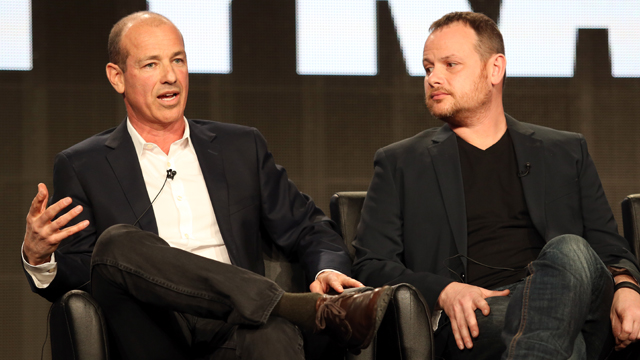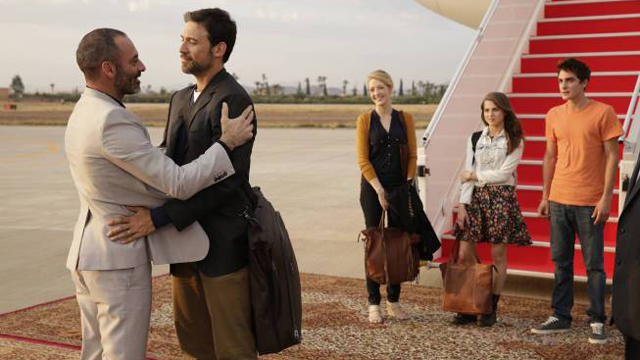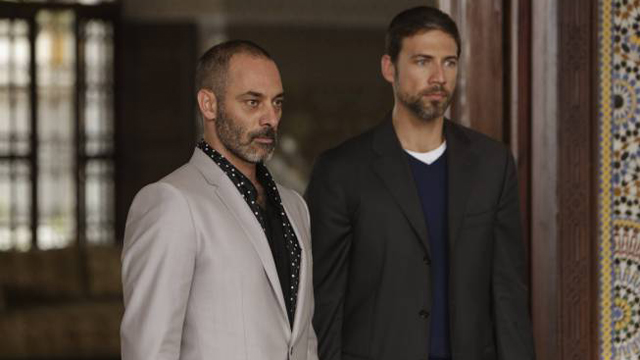The new FX series Tyrant centers around Bassam “Barry” Al-Fayeed: American family man, pediatrician, and son of a ruthless Middle Eastern dictator. He returns to his home country with his family in tow for the first time since his self-imposed exile 20 years ago.
Behind the scenes, the family and political drama has faced numerous difficulties including the loss of its creator, changes in filming location, and not landing its first choice for director.
Here’s what you need to know about the high-stakes, Godfather-inspired series. Watch the video above for an inside look at Tyrant from FX.
1. ’24’ Creator & ‘Homeland’ Producer Howard Gordon Runs the Show
Howard Gordon centers his new drama around the characters usually causing headaches for 24‘s Jack Bauer and Homeland‘s Carrie Mathison. Tyrant revolves around the ruling family of a fictional Middle Eastern country, and one man’s struggle to keep from getting pulled back into the chaos and turmoil.
Gordon told USA Today about the challenge of representing the events in the Middle East that make up “the most volcanic story of our time”:
To set a story, however fictionally, in that part of the world, is a challenge, maybe an insane one, but (one) I couldn’t resist.
The show runner faced challenges off-screen as well when bringing Tyrant to production. First, he wanted Oscar-winning director Ang Lee to direct. The two collaborated on several draft scrips, but Lee ultimately decided to pass on the project. “It was heartbreaking. And the problem at that point was that you had Ang Lee, and now you don’t,” Gordon told The Hollywood Reporter.

(Getty)
The series also lost its original creator, Gideon Raff, who felt his vision wasn’t being heard. He and Gordon previously worked together on the series Homeland, which was based on Raff’s Israeli series Prisoners of War (Hatufim).
Raff got the idea for Tyrant watching a news story on Syria’s President Bashar al Assad, he told reporters at the show’s Television Critics Association panel in January. The leader’s journey from earning a Western education and marrying a British woman to becoming a “mass killer” interested Raff.
…On the news there was a thing about Bashar al Assad, the President of Syria, killing a few dozen people in a city called Daraa. And everybody was saying how horrible he is, a mass killer, he has to go and we have to replace him. And I was thinking that just a few years earlier, everybody was so happy that he, educated in the West, married to a British woman, is coming to replace his father. And I thought he probably misses his life in London now very much.
Raff told The Hollywood Reporter he still reads the scripts and remains in communication with the actors, despite handing over the series to Gordon:
I just felt at a certain point that my creative input wasn’t being heard. I had the option of either staying and arguing, arguing, arguing about the vision, or leaving the show in the very capable hands of Howard Gordon.
2. ‘Tyrant’ Attempts to Humanize & Not Demonize Middle Eastern Culture

Tyrant seeks to humanize a part of the world that the news features daily, but rarely beyond the constant conflict and turmoil of dictatorial leaders and faceless rebel fighters. FX CEO John Landgraf told The Hollywood Reporter how the show will attract an audience but still remain true to the real dangers plaguing the region:
It’s not that you can never show something that looks like a street riot a la Tahrir Square. It’s that, generally speaking, all of it has to have this kind of formalistic exotic beauty to it, because if we can’t seduce people into this world, then we fail.
Tyrant sets its story in the fictional country of Abbudin, which represents several Middle Eastern locations including Egypt, Syria and Jordan. The action remains inside the gorgeous palace walls of the Al-Fayeed family, until they can no longer ignore the outside world.
Star Jennifer Finnigan, who plays Bassam’s wife, Molly Al-Fayeed, told The Hollywood Reporter how the series wants to portray Middle Eastern culture:
We don’t want to just portray the side of that culture that is violent and the sort of terrorism side as a whole. We really want to delve into their real lives and their real stories.
3. British Actor Adam Rayner Plays the Lead Role
The producers set out to cast a Middle Eastern actor in the lead role of Bassam/Barry but instead chose British thespian Adam Rayner. The actor, who starred in TNT’s Hawthorne and the U.K.’s Mistresses, prepared for his role by reading up on past and present Middle Eastern regimes and their families, Rayner told The New York Times.
Being the son of the ruling family in the Middle East, he would have a grasp of the history and religion and politics, which I don’t, so I read as much as I could to fill that gap. I read books on the Hussein family, the Assad family, the Arab Spring and Islam.
Similar to Michael Corleone in The Godfather, Bassam/Barry returns to a family and a life he’s tried to escape for the last 20 years, but the loss of his father will weigh heavily on his decision to stay or return to America. Rayner told The New York Times that his character is the titular tyrant, but he will encounter many more throughout the show:
I don’t know exactly where the story line goes, but I signed on to a story about a man who runs away from a ruling life and is eventually forced to face his dark destiny of taking power himself. It may take some time for him to get there, and there are a lot of tyrants in between.
The pull to that dark side may be too much for Bassam/Barry to resist. When his father falls ill, Bassam/Barry helps his brother Jamal Al-Fayeed (played by Israeli-Arab Ashraf Barhom) secure the family’s rule, but he’ll struggle giving up his own acquired power.
Rayner told USA Today about Bassam/Barry’s shift from siding with the West to rethinking his ties to his home country.
He’s both a very ordinary American family man and there’s also this side of him that will always remain connected to his past, to the regime he grew up in. He made a choice as a young man to side with the West, so to speak, and then finds out that the pull of the other side of him is ultimately stronger.
4. Filming Shifted to Israel After the Pilot Shot in Morocco
Gordon, Raff and Fox 21 studio chief Bert Salke first discussed the idea of Tyrant at the Tel Aviv Hilton in 2012. The pilot was originally slated to shoot in Israel, but was relocated in 2013 due to “awkward political optics,” according to The Hollywood Reporter. Filming moved to Morocco, which possessed a “production community and an Arab population from which to cast extras.”
Watch the video above to hear the cast and crew talk about filming in the North African country.
Unfortunately, Morocco didn’t have an adequate infrastructure necessary to build a working soundstage, and filming was allowed to move to Kfar Saba, Israel, about 10 miles outside of Tel Aviv. Gordon knows an Arab-focused drama shot in Israel could cause backlash, but the series had simply run out of location options, he told The Hollywood Reporter:
Somebody’s going to find some reason, they always do, to be offended, but we’re still in the Middle East, and this place has the architecture, the faces, the music, the colors and the light that we need.
5. Muslim Representative Groups Split on Support

One Muslim advocacy group, the Council on American-Islamic Relations, has already voiced concern over the controversial FX series after screening the pilot in Washington, D.C. CAIR’s National Communications Director Ibrahim Hooper released this statement after the June 18 screening:
In the pilot of FX’s Tyrant, Arab Muslim culture is devoid of any redeeming qualities and is represented by terrorists, murderous children, rapists, corrupt billionaires and powerless female victims. … In Tyrant, even the ‘good’ Arab Muslim are bad. … Unfortunately, Tyrant will be seen by many viewers as an indictment of an entire culture.
According to CAIR, the group reached out to network executives “to discuss potential stereotypes in the series,” but no meeting reportedly took place. Gordon has been working with the Muslim Public Affairs Council and Muslims on Screen and Television, and he hired a Palestinian filmmaker to consult on the Israeli set, according to The Hollywood Reporter.
Gordon has faced similar criticism on his past shows, but he stressed to reporters at Tyrant‘s TCA panel that the show is a “family drama against this very tough political situation”:
People will see what they want to see in it. I’ve been called an Islamaphobe and a torture mongerer. So what else can they call me?